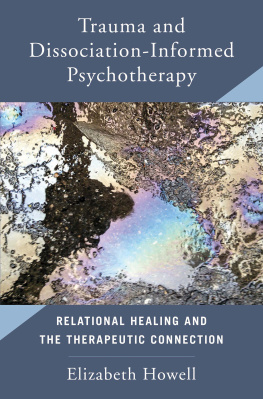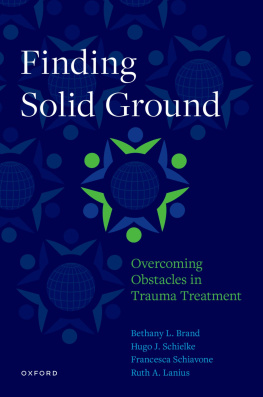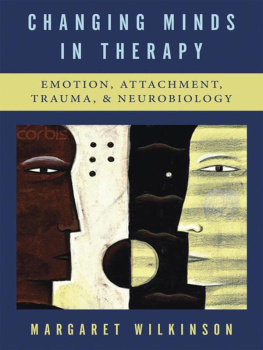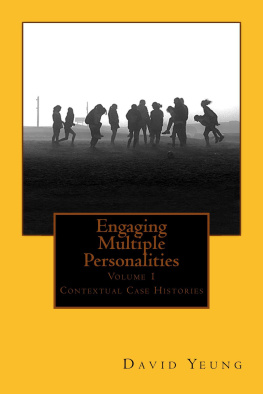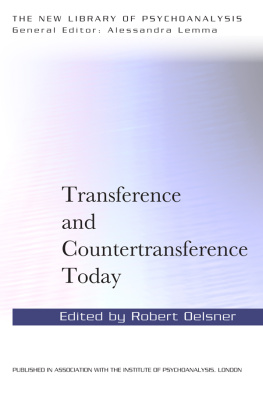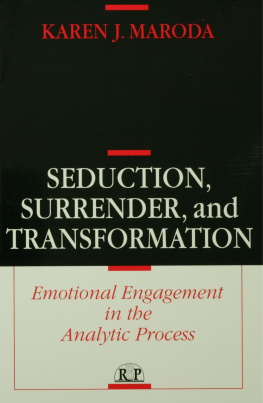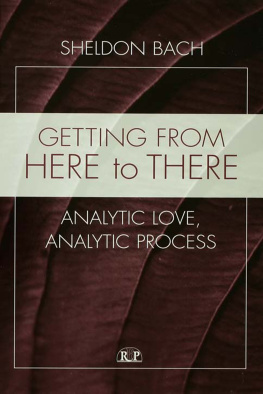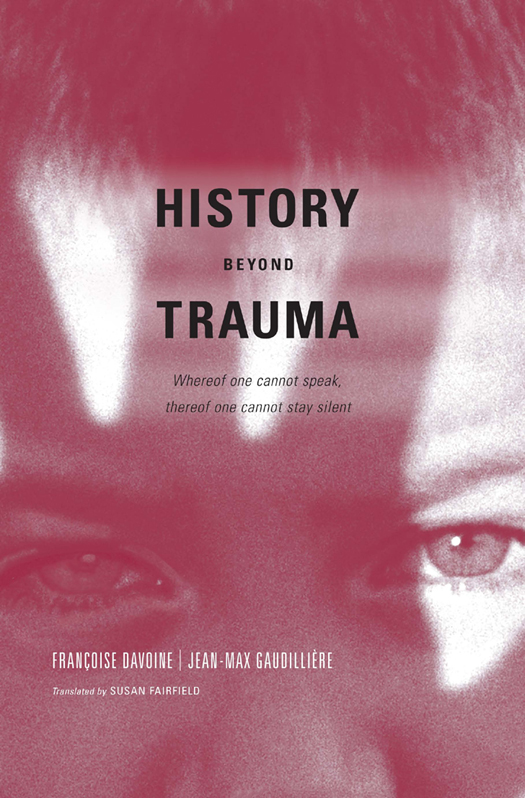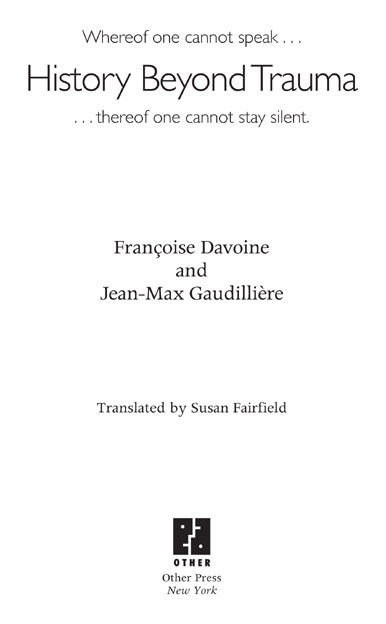History Beyond Trauma
Franoise Davoine and Jean-Max Gaudillire remind us, convincingly, that madness can only be genuinely understood when seen in its proper personal, social, and historical contexts. History Beyond Trauma is a genuine labor of love and stands in stark, and refreshing, contrast to the current dominance of a simplistic biogenetic ideology with its unhelpful overreliance on diagnoses and drugs. The authors are to be congratulated on a truly personal approach to a topic that has been depersonalized for far too long.
Dr. John Read
Director of Clinical Psychology, University of Auckland, New Zealand; Editor, Models of Madness (Brunner-Routlege 2004)
This is one of the most compelling examples of what can be gained by crossing boundaries. In a work that cannot be pigeonholed as clinical, anthropological, philosophical, or historical, the authors succeed in weaving together the results of their many years of clinical experience in different cultures with a profound rereading of philosophy, history, and psychoanalytic theory. Never lost from sight are the compelling individual stories of madness and war that serve as the touchstone for a rich series of meditations on the meaning of our links to each other and to our individual and social histories.
Lynn Hunt
Eugen Weber Professor of Modern European History, UCLA
In their wide-ranging and erudite study of the psychoanalytic treatment of the psychoses, a deep consciousness of shared humanity gives the authors the courage and imagination to cross the psychotic break to discover the human being on the other side. History Beyond Trauma encourages us to be equally brave and creative in facing the human condition we call madnessin others, in society, in ourselves.
Thomas A. Kohut
Sue and Edgar Wachenheim III Professor of History and Dean of the Faculty, Williams College
Written in a nonlinear style that tracks transferential movements, History Beyond Trauma assembles insights derived from both clinical practice and teaching at the prestigious Ecole des Hautes Etudes en Sciences Sociales. The authors not only explore the intricacies of transferential relations with respect to those diagnosed as psychotic or mad, but also boldly bring psychoanalysis and history into thought-provoking dialogue and elucidate how the analysis of trauma necessarily comes up against pieces of the Real embedded in historical experiences (notably the atrocities of war and genocide). In exploring the role of trauma and its haunting symptoms, the authors themselves respond to the call of the books Wittgensteinian subtitle and indicate how what cannot be spoken can be shown in symptoms and to some viable extent possibly worked through.
Dominick LaCapra
Bryce and Edith M. Bowmar Professor of Humanistic Studies and Director, School of Criticism and Theory, Cornell University
Davoine and Gaudillire give us the benefit of three decades of working as clinical analysts and researchers with survivors of trauma. Their wide-ranging book speaks miles about how society views the madness of war and other horrors. History Beyond Trauma offers a masterfully original perspective on those who are mad, and also on those who seek to help them.
Elizabeth Loftus, Ph.D.
Distinguished Professor, University of California-Irvine;
Past President, American Psychological Society
History Beyond Trauma is compelling. The authors are insightfuland compassionatereaders of the human condition.
Dr. Gregory Nagy
Francis Jones Professor of Classical Greek Literature and Professor of Comparative Literature, Harvard University.
Copyright 2004 Franoise Davoine and Jean-Max Gaudillire
Production Editor: Robert D. Hack
All rights reserved. No part of this publication may be reproduced or transmitted in any form or by any means, electronic or mechanical, including photocopying, recording, or by any information storage and retrieval system, without written permission from Other Press LLC, except in the case of brief quotations in reviews for inclusion in a magazine, newspaper, or broadcast. For information write to Other Press LLC, 2 Park Avenue, 24th floor, New York, NY 10016. Or visit our Web site: www.otherpress.com.
The Library of Congress has cataloged the printed edition as follows:
Davoine, Franoise.
History beyond trauma / by Franoise Davoine & Jean-Max Gaudillire; translated by Susan Fairfield.
p. cm.
Includes bibliographical references.
eISBN: 978-1-59051-658-4
1. Post-traumatic stress disorder. 2. Psychic trauma. 3. Psychoanalysis. 4. WarPsychological aspects. 5. Mental illnessSocial aspects. 6. Intergenerational relations. I. Gaudillire, Jean-Max. II. Title.
RC552.P67 .D386 2004
616.8521dc22
2003022677
v3.1
Contents
Foreword
I n 1979 Franoise Davoine and Jean-Max Gaudillire visited the Austen Riggs Center in Stockbridge, Massachusetts, for the first time. Riggs is a small, unusual psychiatric hospital in that it treats severely disturbed patients with intensive psychoanalytic psychotherapy in a completely open therapeutic community. Its treatment program was established in the late 1940s by Robert Knight, David Rapaport, and a number of other brilliant young psychoanalysts from the Menninger Clinic. Joined soon thereafter by Erik Erikson, this group made major contributions to the theory and clinical practice of psychoanalytic ego psychology.
When Otto Will became Riggss medical director in the late 1960s, he guided the hospital toward treating the more obviously psychotic patient. Having had years of experience at Chestnut Lodge, Dr. Will was a charismatic clinical genius whose work with schizophrenic patients included a rugged fearlessness, a Sullivanian conviction about the ordinary humanity of all people, and the strong impression that he knew his patients suffering at first-hand. But an ongoing tensionsometimes creative and sometimes problematicdeveloped at Riggs between the ego-psychology emphasis on the patients adaptation to their community (including the hospital community, which was the context for treatment) and the interpersonalist emphasis on meeting the patient in his or her regression.
Into this unsettled mix of treatment perspectives came Drs. Davoine and Gaudillire. They presented a clinical case, a story of work with a psychotic patient, and it somehow spoke across the language barrier to all segments of the Riggs therapy staff. It left no doubt that they did indeed meet their patients, but it also suggested that the patients psychosis was not simply an attack on the social order, but, at a deeper level, a frantic effort to bring a foreclosed social connection into existence.
Since that time, Drs. Davoine and Gaudillire have presented at Riggs on a number of occasions and have offered many individual consultations to staff. As is true in the various parts of the world where they teach, the therapists who consult them find the experience illuminating, relieving, and, to some degree, magical. They feel not only that they understand their patients better and differently, but that they understand themselves with their patients in a new way. They also find themselves freed from whatever doctrinaire positions they may have accepted in their training. Most of all, they feel grateful to discover that both they and their patients are situated in a larger dimension of history, that history pervades the individual lives of each, and that recognizing this endows the patients symptoms, and their use of the analyst, with hitherto unformed meaning.


